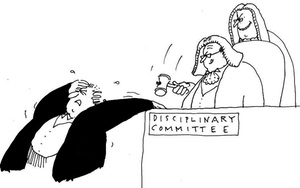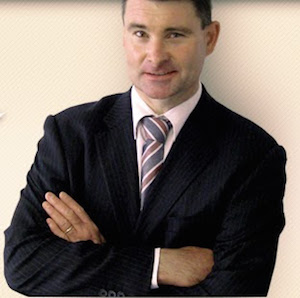Excuses, excuses
 Hellfire Club •
Hellfire Club •  Friday, November 14, 2014
Friday, November 14, 2014 Nifty Legal Aid scam sees WA solicitor thrown off the jam roll ... Sneaky website directed legal aid applicants straight to Perth law shop ... Also, Queensland solicitor survives a failure to declare income to the ATO and Centrelink ... Kate Lilly reports
 Love of Legal Aid
Love of Legal Aid
A Perth solicitor who came up with an ingenious idea of creating a look-alike Legal Aid website has been struck off the roll.
Last month, the WA Supremes found Dean Richard Love created an intentionally misleading webpage in order to divert clients who intended to make an application to the Legal Aid Commission of Western Australia.
Justices Andrew Beech, Kenneth Martin and James Edelman described Love's misconduct as "aimed at advancing [his] financial interests in preference to the interests of those to be deceived, and of involving a sustained plan of deception continuing over a period of many weeks".
Love also was found to have misled the Legal Aid by falsely representing that he had consulted with a client whose case had legal merit.
The dodgy website
The Legal Aid Commission allows a panel of solicitors to apply for aid on behalf of prospective clients using a web interface called Grants Online.
Practitioners are required to consult with the applicant beforehand and must provide their opinion as to the legal merits of the defence or claim. If a grant of aid is approved, the practitioner who made the application is usually appointed to act on the client's behalf.
In early 2012 Love, who sat on the Legal Aid panel, created a website under the domain name www.applyforlegalaid.com.au.
On accessing the site there was a document entitled Legal Application Form, bearing the WA Legal Aid logo.
The website did not indicate where the application form was to be sent after the user clicked "submit".
On March 29, 2012, a respondent in a child custody case (Ms P) accessed Love's website and filled out the application form, believing she was submitting an application directly LAWA.
In fact, her application was sent to Dean R Love & Associates.
Love then submitted an aid application on Ms P's behalf via Grants Online. He took the liberty of filling in blank questions and indicated that Ms P had declared the information to be true and correct, even though there had been no direct communication between them. He also gave the opinion that Ms P's case had legal merit.
Sometime later, Legal Aid told Ms P that her application was refused and that her lawyer, Mr Love, had been notified.
At that point, Ms P told a startled Legal Aid officer that she had never heard of Love.
 Dean Love: the dodgy legal aid manState Administrative Tribunal
Dean Love: the dodgy legal aid manState Administrative Tribunal
Love consented to findings of professional misconduct earlier this year when he appeared before the SAT. Nonetheless, he submitted that:
- The harm done as a result of his actions was minimal;
- He had 'pleaded guilty' early and completed four ethics courses in November 2013;
- He had ceased legal practice in November 2013 and suffered financial hardship;
- He could provide numerous positive character references.
The tribunal remained flint-hearted, describing his conduct as "disgraceful and dishonourable":
"The legal aid system is publicly funded and is essential to the fair and just operation of Western Australia's judicial system. Its resources are limited. This deceptive behavior in dealing with LAWA cannot be tolerated."
Love's numerous positive character references were given little weight in light of three previous stints before the tribunal:
"Those findings were that the practitioner had failed to treat a client fairly and to protect that client's interest, that he fell short of the standard of competence and diligence that a member of the public is entitled to expect of a reasonably competent legal practitioner and that he acted recklessly and contrary to instructions from a third party in order to advance his own interests."
The matter was referred to the Supreme Court with a recommendation that Love be removed from the roll.
Not a fit and proper person
Before the WA Supreme Court the solicitor came up with a psychiatric report:
• He has "a major depressive illness for which he requires treatment";
• He "is likely to have experienced depressed mood during the period in which the complaints were made, and certainly in the period 2010 to the present";
• Depressive illnesses "are associated with a pervasively negative outlook, and are often accompanied by reduced concern about the possible consequences of one's actions";
• "The stress of working very long hours, the stress of facing complaints about his practice and also his anxiety about making mistakes ... are likely to have contributed to the development of his depressive illness";
• There was probably a relationship between the effect of a "chronic depressive illness and the behaviour that led to each of the complaints".
Their Hons stressed that a diagnosis of depression does not "automatically excuse or mitigate professional misconduct ... particularly conduct involving dishonesty."
Furthermore, the court expressed general concern over what was characterised as a lack of remorse on the part of the hapless solicitor:
"The practitioner's submissions to the tribunal ... contained no indication that the practitioner acknowledged that he had intentionally misled a client, or that he understood that such conduct is entirely unacceptable and fundamentally inconsistent with the duties of a legal practitioner."
Finally:
"The penalty of striking a practitioner off the roll is an extreme one. It has dire consequences for the practitioner ...
After careful deliberation, we have come to the view that the practitioner is not a fit and proper person to practise law. In our view, the professional misconduct in which the practitioner engaged, viewed in the context of his previous disciplinary history and his lack of insight and remorse, compels this conclusion."
Poor Love.
* * *
Oh ... that $45,000!
A Queensland solicitor who failed to declare $45,000 worth of income she received as a law student has escaped with a slap on the wrist with wet spinach by the Queensland Supreme Court.
Emanuela Eve Scott was hit by a car in 2008 and listed her income as a cleaner and part-time model in a personal injuries claim.
The vehicle's third party insurer notified the Legal Services Commissioner in 2012, after noticing the extra $45,000 had never been disclosed to Centrelink or the Australian Tax Office.
Last month, Justices Hugh Fraser, Roslyn Atkinson and Alan Wilson ordered Scott to pay Legal the Services Commissioner's costs, but said she was still fit and proper.
Failure to disclose
Scott's undeclared income was relevant to her application for admission to practice in 2010.
Wilson J, for the court, noted that applicants are:
"Obliged to approach the [Legal Practitioners Admission Board], and later the court, with the utmost good faith and candour, comprehensively disclosing any matter which may reasonably be taken to bear on an assessment of fitness for practice."
 Less than three months before her personal injuries claim, Scott prepared an affidavit for the admission board in which she was required to provide any information that might be relevant to her fitness for practice.
Less than three months before her personal injuries claim, Scott prepared an affidavit for the admission board in which she was required to provide any information that might be relevant to her fitness for practice.
Her failure to disclose $45,000 worth of income to the ATO was certainly relevant. However, Scott only revealed in her affidavit a charge of shoplifting and unlicensed driving (for which she had received small fines) and a 2008 Centrelink debt on the affidavit.
On receiving the insurer's letter in 2012, the Legal Services Commissioner wrote to Scott, demanding a prompt reply.
Subsequently, she came clean, took steps to organise tax returns for 2004-2008 and made a full disclosure to Centrelink.
The ATO returned Ms Scott's belated payment of $11,000 after an adjustment of her estimated tax liability and Centrelink never chose to pursue her.
Scott attributed her forgetfulness to a head injury sustained in the car accident.
Her employer gave evidence that Scott, "appeared to suffer recurring severe and debilitating headaches, and memory loss".
Wilson J mentioned that Scott's practising certificate was renewed by the Queensland Law Society this year, after it found her explanation for the non-disclosure was "reasonable and acceptable".
The commissioner and the court
The purpose of the commissioner's application was to bring the matter to the court's attention - which Ms Scott might have done herself.
Although only seeking to recover costs, the LSC was not entirely uncritical of Scott's conduct:
• The fact that she wasn't required to pay back any money did not address her breach of duty to the court and to the Legal Practitioners Admissions Board.
• Scott remembered her extra income at the time of her personal injuries claim, but had forgotten about it when she prepared her affidavit less than three months earlier. The Commissioner suggested, "the explanations for her failure do her no particular credit".
• She delayed approaching Centrelink and the ATO for a few months.
• She ought to have brought the application herself in light of her continuing obligation as a lawyer to correct any misinformation she has allowed to be placed before the court.
However, Wilson thought there was "no basis" to reject her head injury explanation.
He noted:
"The material filed on her behalf shows full and untrammelled insight, and remorse; and, also, that she has taken all proper and necessary steps to remedy the legal consequences of her oversight."
Her failure to apply to the court herself was "a product of the legal advice she received".
Wilson also mentioned a "glowing reference" from Scott's current boss and concluded that she shown herself to be a fit and proper person since her admission to practice. He also found that her delay in approaching Centrelink and the ATO was explainable, considering she had to secure an accountant and organise her tax returns.
"The experience of facing these proceedings, addressing the consequences of her non-disclosure, and paying the commissioner's costs is sufficient in terms of ensuring Ms Scott is personally deterred from any other offending conduct; and, in the unusual circumstances of this case, also sufficient general deterrence by way of reminding all practitioners that the disclosure requirements surrounding admission as a legal practitioner are highly important, and very stringent."
Bravo. Emanuela lives to fight another day.
See: judgment in full
Reporter: Kate Lilly
 Depression,
Depression,  Professional misconduct,
Professional misconduct,  Taxation
Taxation 








Reader Comments